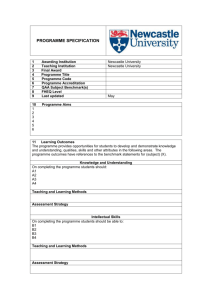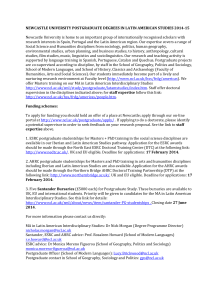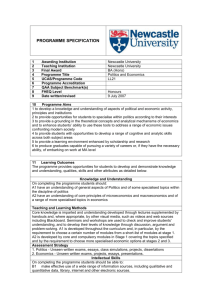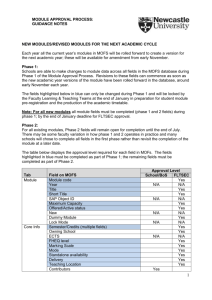Designing Chemical Solution (5098) 1 UNIVERSITY OF
advertisement
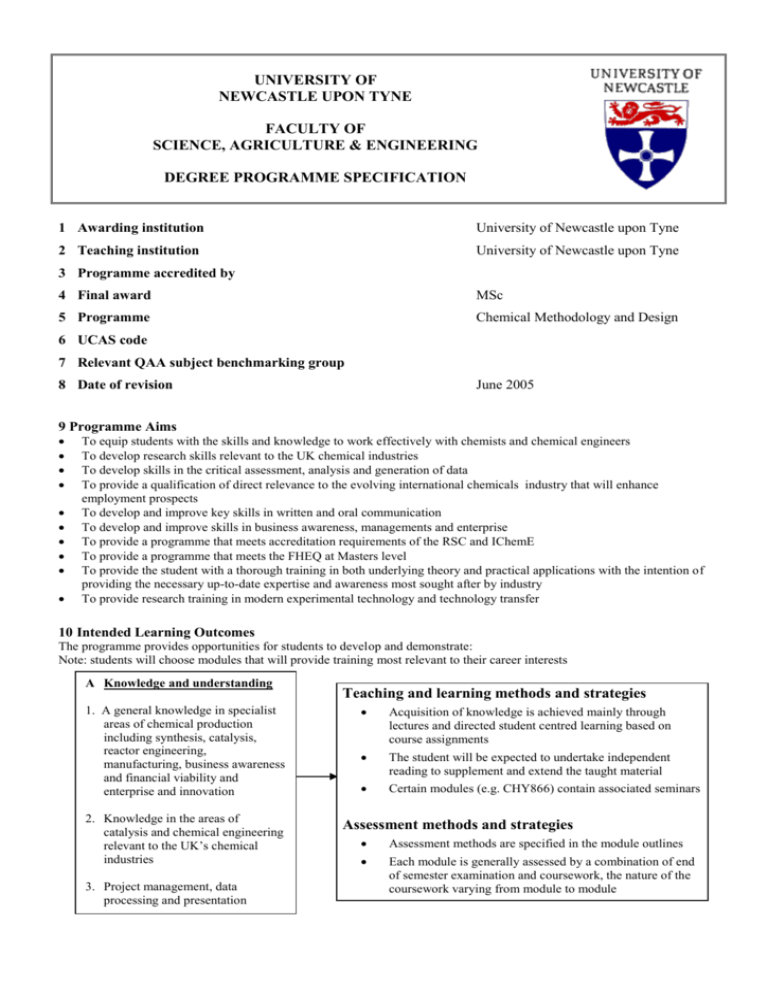
UNIVERSITY OF NEWCASTLE UPON TYNE FACULTY OF SCIENCE, AGRICULTURE & ENGINEERING DEGREE PROGRAMME SPECIFICATION 1 Awarding institution University of Newcastle upon Tyne 2 Teaching institution University of Newcastle upon Tyne 3 Programme accredited by 4 Final award MSc 5 Programme Chemical Methodology and Design 6 UCAS code 7 Relevant QAA subject benchmarking group 8 Date of revision June 2005 9 Programme Aims To equip students with the skills and knowledge to work effectively with chemists and chemical engineers To develop research skills relevant to the UK chemical industries To develop skills in the critical assessment, analysis and generation of data To provide a qualification of direct relevance to the evolving international chemicals industry that will enhance employment prospects To develop and improve key skills in written and oral communication To develop and improve skills in business awareness, managements and enterprise To provide a programme that meets accreditation requirements of the RSC and IChemE To provide a programme that meets the FHEQ at Masters level To provide the student with a thorough training in both underlying theory and practical applications with the intention of providing the necessary up-to-date expertise and awareness most sought after by industry To provide research training in modern experimental technology and technology transfer 10 Intended Learning Outcomes The programme provides opportunities for students to develop and demonstrate: Note: students will choose modules that will provide training most relevant to their career interests A Knowledge and understanding 1. A general knowledge in specialist areas of chemical production including synthesis, catalysis, reactor engineering, manufacturing, business awareness and financial viability and enterprise and innovation 2. Knowledge in the areas of catalysis and chemical engineering relevant to the UK’s chemical industries 3. Project management, data processing and presentation Teaching and learning methods and strategies Acquisition of knowledge is achieved mainly through lectures and directed student centred learning based on course assignments The student will be expected to undertake independent reading to supplement and extend the taught material Certain modules (e.g. CHY866) contain associated seminars Assessment methods and strategies Assessment methods are specified in the module outlines Each module is generally assessed by a combination of end of semester examination and coursework, the nature of the coursework varying from module to module Designing Chemical Solution (5098) 2 B Practical Skills – able to 1 Work safely and independently in a chemistry laboratory 2 Demonstrate an advanced level of competence in practical chemistry Teaching and learning methods and strategies The ability to work safely in a laboratory is of paramount importance. The integration of science and management is an important aspect of practical work. Assessment methods and strategies These skills are assessed via laboratory diaries, reports, regular meetings 3 Assist in the design, implementation and management of a chemical laboratory C Cognitive skills - able to 1 Critically analyze, interpret and evaluate research results and literature articles relating to chemistry and chemical processes 2 Assess commercial viability of chemical processes 3 Demonstrate the skills necessary to plan, conduct and report a programme of original research 4 Carry out rigorous safety assessments of chemical procedures Teaching and learning methods and strategies Intellectual skills are developed by means of the teaching and learning programme, which includes practical project work, seminar work and coursework assignments. The research project in particular is designed to allow students to demonstrate achievement is all the learning outcomes in this category. Assessment methods and strategies Intellectual skills are partly assessed through formal examinations but assessment of coursework and practical project work is used to assess higher order skills. A variety of assessment methods are used, including formal written reports, essay and oral poster presentations. D Key skills - able to 1. Communicate and express clearly ideas both orally and in writing and the preparation of professional scientific reports for the wider chemical community 2. The ability to works as a team, demonstrate planning and organization skills, manage time and complete work to meet deadlines 3. The ability to use computer-based information sources for decision making and for independent learning for CPD 4. Be able to use scientific data bases to source information 5. Exercise initiative, decision making and personal responsibility in a chemical process environment 6. Ability to critically evaluate data and use when required. 7. Laboratory organization and project management Teaching and learning methods and strategies The research project requires regular written work, the use of a range of search libraries and the Internet. The Research Project plus dissertation and the Data processing and presentation modules provide training in key professional skills Assessment methods and strategies Key skills will be assessed through a combination of a poster presentation, a short lecture presentation, a preliminary literature survey relevant to the project, a viva with 3 members of staff and a final report. Use of scientific data bases will be assessed through the reports and regular meetings. Designing Chemical Solution (5098) 11. 3 Programme Features, Curriculum and Structure A Features The programme is offered in full time mode (1 year) or part time mode (2 year), to a total of 180 credits There are a combination of compulsory (bold) and optional modules (italics) o Students will take a total of 70 credits in semesters 1, 30 credits of compulsory modules and 40 credits selected from the optional modules o Students will take 50 credits in semesters 2, including the compulsory modules CHY869, CPE876, CPE883 and CPE853 and an additional 20 credits from the remaining optional modules o Students will take the compulsory 60 credit module: Research Project and Dissertation The programme of part time study may commence at the beginning of semester 1 or 2 with the agreement of the DPD and the 60 credit project will begin once suitable training has been received and appropriate modules completed. In the case of part time study the project may extend over several semesters. Module CHY868 must be completed before CHY865 and CHY869 must be completed in advance of CHY895. Distinctive Features The taught programme concentrates on the underlying theory and practical applications of many modern topics in chemistry and chemical engineering which can be applied to problems of immediate industrial concern The programme has been designed to provide combined knowledge and skills in chemistry, chemical engineering, business and management The programme includes the module Innovation and Enterprise that aims to increase awareness of the challenges of business, particularly technology based business and introduces aspects of project management The research project and dissertation will provide training in how to tackle and how to communicate the results of a significant research problem in chemistry using modern techniques The relevance of the programme to industry is assessed through the involvement in some modules of visiting scientists from leading industrial companies Suitable for part-time study B Structure Semesters 2 CPE876 CHY865 Semester 1 CHY800 Applied Photochemistry (20) PAQ802 Principles of Process Engineering (10) CHY868 Instrumental Analysis (10) CHY815 Chemical Sensors (20) CHY866 Catalyst Application and Design (20) CHY867 Further Inorganic Chemistry (10) CPE883 CPE853 CPE809 CPE810 CHY869 LCE814 Innovation and Enterprise (10) Analytical Chemistry for Process Control (10) HSE Impact on Enterprise (5) Research Methodology & Management of Experimental Data (5) Renewable Energy: Hydrogen Fuel Cell Technology (10) Renewable Energy: Biomass & Waste Technology (10) Project Preparation: Techniques for Synthesis and Catalysis (10) English (writing dissertations) Semester 3 CHY895 Research Project and Dissertation (60) Designing Chemical Solution (5098) C 4 Programme Curriculum (For University regulations and general information see: http://www.ncl.ac.uk/calendar/university.regs/) Development of specific Intended Learning Outcomes occurs through the following modules (compulsory modules in bold text, optional modules in normal, italic text) A1. A general knowledge in specialist areas of chemical production including synthesis, catalysis, reactor engineering, manufacturing, business awareness and financial viability and enterprise and innovation A2. Knowledge in the areas of catalysis and chemical engineering relevant to the UK’s chemical industries CHY866, PAQ802, CPE876, CPE883, CPE810, CPE809, CHY867 A3. Laboratory organization, project management, data processing and presentation B1. Work safely and independently in a laboratory B2. Undertake an original piece of research B3. Assist in the design, implementation and management of a chemical laboratory C1. Critically analyze, interpret and evaluate data CPE876, CPE853, CHY869, CHY895, LCE814 C2. Assess commercial viability of a process and apply learnt knowledge to unseen problems C3. Demonstrate the skills necessary to plan, conduct, and report a programme of original research C4. Carry out rigorous safety assessments of chemical procedures D1. Communicate and express ideas orally and in writing D2. Team work, planning organization and time management D3. The ability to use computer-based information sources for decision making and for independent learning for CPD D4. Find information from a range of sources and data bases D5. Initiative and personal responsibility D6. Critically evaluate data and use when required D7. Laboratory organization and project management CHY866, PAQ802, CPE809, CPE810 CHY895, CHY869, CPE876, CPE853, CPE883 CHY895, CHY869 CHY895, CHY869, CPE876, CPE883 CHY895, CHY869, CPE853, PAQ802, CHY800, CHY868, CHY815, CHY865 CHY895, CHY869, CPE876, CPE883, CHY800, CHY868, CHY815, CHY865 CHY895, CHY869, CPE853 CPE876, CPE883, CHY869, CHY895 CHY895, CHY869, CHY866, CPE853, CHY800, CHY868, CHY865, CHY815 CHY895, CHY869, CHY866, CPE883, CPE876, CHY800, CHY868, CHY815 , CHY867 CHY895, CHY869, CPE883, CPE876, CPE853, CHY867 CHY895, CHY869, CHY866, CPE853, CHY800, CHY865, CHY868, CHY867 CHY895, CHY869, CPE883, CPE876, CHY815, CHY867 CHY895, CHY869, CPE876, CPE883, CPE853, CHY800, CHY868, CHY865 CHY895, CHY869, CPE876, CPE883, CPE853 Designing Chemical Solution (5098) 12 5 Criteria for Admission: Standard entrance criteria A minimum of a 2nd class honours degree in Chemistry from a UK University, or its overseas equivalent, is the normal qualification for entry. Other closely related subjects, e.g. Applied Chemistry, are also acceptable Non native speakers of English, that have not been exempted from the requirements of the University English Language Policy, are required to have an IELTS score of 6.5 (or equivalent) or 65 on the Language Centre scale. Entry into the MSc programme is conditional on attainment of the threshold level of 6.5 on the IELTS scale. Applicants with non-standard qualifications Applicants who hold non-standard qualifications will be considered on an individual basis. Admissions Policy Upon receipt of a completed application form, UK- based applicants will be invited to visit the School of Natural Sciences for an informal interview. Offers of places are made to suitable candidates following the visit; these may be conditional on the applicant achieving a 2nd class degree (if they do not hold such a qualification at the time of interview) and upon the receipt of a satisfactory reference or references. EPSRC funding and any other funding that may be available is awarded on a competitive basis. Applicants not based in the UK are not required to attend for interview. 13 Support for Students and their Learning: Induction The first week of the first term/semester is an Induction Week with no formal teaching. During this period all students will be given detailed programme information and the timetable for their first semester. In particular all new students will be given general information about the School and their course, as described in the Degree Programme Handbook. The International Office offers an additional induction programme for overseas students (see http://www.ncl.ac.uk/international/coming_to_newcastle/orientation.phtml). There is an Induction Week Programme in Natural Sciences which includes social events as well as informative presentations about the course, facilities and student support. Each student receives a Welcome Package, laboratory coat, Periodic Table etc. Returning students also have induction week programmes. Study skills support Students will learn a range of Personal Transferable Skills, including Study Skills, as outlined in the Programme Specification. Academic support The initial point of contact for a student is with a lecturer or module leader, or their tutor (see below) for more generic issues. Thereafter the Degree Programme Director or Head of School may be consulted. Issues relating to the programme may be raised at the Staff/Student Committee, and/or at the Board of Studies. Pastoral support All students are assigned a personal tutor whose responsibility is to monitor the academic performance and overall well-being of their tutees. Details of the personal tutor system can be found at http://www.ncl.ac.uk/undergraduate/support/tutor.phtml. In addition the University offers a range of support services, including the Student Advice Centre, the Student Counselling Service, the Mature Student Support Service, and a Childcare Support Officer, see http://www.ncl.ac.uk/postgraduate/index.phtml. Support for Special Needs Support for students with special needs is provided as required and the University’s Disability Support Service can be consulted where appropriate. For further details see http://www.ncl.ac.uk/undergraduate/support/disability.phtml and http://www.ncl.ac.uk/postgraduate/index.phtml Learning resources The University’s main learning resources are provided by the Robinson and Walton Libraries (for books, journals, online resources), and Information Systems and Services, which supports campus-wide computing facilities, see http://www.ncl.ac.uk/undergraduate/support/facilities/index.phtml All new students whose first language is not English are required to take an English Language test in the Language Centre. Where appropriate, in-sessional language training can be provided. The Language Centre houses a range of resources for learning other languages which may be particularly appropriate for those interested in an Erasmus exchanges. See http://www.ncl.ac.uk/langcen/elc/, http://www.ncl.ac.uk/undergraduate/international/ and http://www.ncl.ac.uk/undergraduate/support/langcen.phtml. Designing Chemical Solution (5098) 14 6 Methods for Evaluating and Improving the Quality and Standards of Teaching and Learning Student Evaluations of Modules and the MSc Programme Student opinion about the modules is gathered annually. The Programme is evaluated by means of a questionnaire towards the end of the course. There is a Chemistry Staff-Student Committee and the MSc students are invited to select a representative for the committee. The MSc Board of Studies conducts an annual review of the programme. The comments and recommendations of the External Examiner and comments from future internal subject reviews will be considered by the Board. Graduate surveys will be conducted for consideration. Programme reviews Student opinion about the modules is gathered annually. All stages of the Programme are evaluated by means of module and programme Reviews. The School operates a system of Peer Observation of teaching activities following the Guidelines issued by the University’s Quality and Standards Section. The Board of Studies conducts an annual review of the programme. The Board considers the comments and recommendations of the External Examiners. Graduate surveys are conducted for consideration. The Board will consider comments and recommendations arising from any subject reviews. The Director of Teaching (who is also the Chair of the Board of Studies) and/or Degree Programme Director is available to discuss academic issues with students throughout the course with a view to improving the quality and standard of teaching and learning. The External Examiner confirm that the standards are appropriate on an annual basis. The Board of Studies conducts an Annual Monitoring and Review of the degree programme and reports to Faculty Teaching and Learning Committee. External examiner reports External Examiner reports are considered by the Board of Studies under Reserved Business, in the absence of the student representatives. The Board responds to these reports through Faculty Teaching and Learning Committee. Accreditation reports The School is committed to submitting this programme for accreditation by the RSC and IChemE. Student evaluations All modules, and the degree programme, are subject to review by student questionnaires. Informal student evaluation is also obtained at the Staff/Student Committee, and the Board of Studies. Feedback mechanisms Feedback to students is effected via the Staff/Student Committee and the Board of Studies. Faculty and University Review Mechanisms The Programme is subject to the University’s Internal Subject Review programme, see http://www.ncl.ac.uk/internal/academic-quality/qualityhome.htm#2. 15 Regulation of Assessment: Assessment Rules and Degree Classifications The course consists of a number of modules. The credit value for the modules varies from 5 – 60. The assessment methods used are indicated in the module descriptions in the handbook. They include written examinations, assignments and in-course assessment. In addition, the project module is assessed by presentation, viva and dissertation. Pass Mark The pass mark, as defined in the University’s Taught Postgraduate Examination Conventions, Designing Chemical Solution (5098) 7 (http://www.ncl.ac.uk/regulations/university.regs/tpmdeprexamconv.pdf) is 50. Course Requirements Progression is subject to the University’s Taught Postgraduate Entrance and Progress Regulations (http://www.ncl.ac.uk/regulations/university.regs/tpmdepr.pdf) and Taught Postgraduate Examination Conventions (http://www.ncl.ac.uk/regulations/university.regs/tpmdeprexamconv.pdf). Common Marking Scheme The University employs a common marking scheme, which is specified in the Taught Postgraduate Examination Conventions (http://www.ncl.ac.uk/regulations/university.regs/tpmdeprexamconv.pdf) namely: Summary description applicable to postgraduate masters programmes Summary description applicable to other postgraduate programmes <50 Fail <50 Fail 50-59 Pass 50 or above Pass 60-69 Pass with Merit 70 or above Pass with Distinction Award of a Diploma/Certificate The board of examiners at its discretion may award a Diploma or Certificate to students who do not meet the requirements of the MSc according to the University Regulations. For details of regulations see: http://www.ncl.ac.uk/calendar/university.regs/ Role of External Examiner An External Examiner for the course is appointed by the SAGE Faculty Teaching Committee. The external examiner is a distinguished member of the community with expertise in the subject area. The role of the external examiner is that of a moderator; to do this he performs the following functions: Sees the examination scripts and comments upon the standard of examination questions and marking. Sees coursework and comments on the standard of working. Examines the dissertations and comments on their topics. Performs viva voce examinations of some or all of the students. Attends the August Board of Examiners meeting. Reports to the University on standards. 16 Indicators of Quality and Standards: Professional Accreditation Reports Not applicable Internal Review Reports The School’s existing programmes were covered by the Internal Subject Review of Chemistry held on February 2003 and subsequently approved by Faculty Teaching and Learning Committee and University Teaching and Learning Committee. The team was impressed by the very positive relationships between staff and students – it was abundantly clear that the subject groups are very student-focused and this was to their significant credit. Previous QAA Reports A closely related MSc programme Designing Chemical Solutions was subject to a QAA Developmental Engagement in April 2004 which confirmed confidence in quality and standards This specification provides a concise summary of the main features of the programme and of the learning outcomes that a typical student might reasonably be expected to achieve if she/he takes full advantage of the learning opportunities provided. The accuracy of the information contained is reviewed by the University and may be checked by the Quality Assurance Agency for Higher Education. 17 Other Sources of Information: Designing Chemical Solution (5098) The University Prospectus (see: http://www.ncl.ac.uk/postgraduate/index.phtml ) The School Prospectus (see: http://www.ncl.ac.uk/nsci/postgrad/chemistry/taught_degrees/index.htm) The University and Degree Programme Regulations (see http://www.ncl.ac.uk/calendar/pdf/uniregs.pdf and http://www.ncl.ac.uk/calendar/sae/) The Degree Programme Handbook QAA Subject Review Report 8
